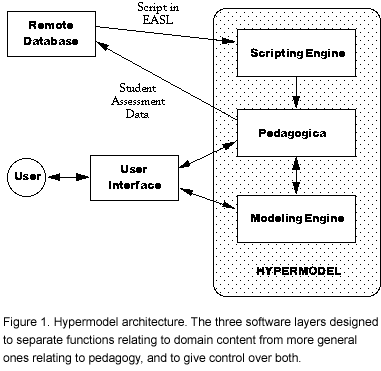Hypermodel
Jump to navigation
Jump to search
Definition
- Hypermodel probably refers to a lot things...
- In educational technology, hypermodel has probably be coined by Robert Tinker and refers to a sort of pedagogically structured microworld.
The instructional design model and the systems architecture
- We should this topic to some other page some day - DSchneider 16:21, 21 July 2006 (MEST)
- “Hypermodels share some characteristics with CAI (computer assisted instruction) applications, which also control what the learner sees, evaluate progress, and, if they are "intelligent," can adapt to student responses and learning styles. The critical difference is that hypermodels have at their core a sophisticated tool that students can use to learn content through exploration and inquiry; a constructivist educational strategy. In contrast, CAI software is usually much more directive and "instructivist."” (Tinker: 2001).
- “Our underlying tools embody a pure constructivist philosophy that permits students to learn through open-ended exploration. Even though this type of learning is powerful, students can take too much time and miss important topics and the tool can be difficult to disseminate and confusing for beginners. Pedagogica converts the tool into a hypermodel that is somewhat instructivist, because the script constrains the tool and guides the learner to discover specific concepts that a curriculum developer has selected. Done well, students still learn through their own explorations, but within constrained domains and with guidance that ensures that most students discover the important concepts.”
Examples
- See systems built with Pedagogica (Tinker: 2001).
References
- Robert Tinker (2001), Perspective, Hypermodels: New Tools for Learning, @CONCORD: Volume 5, No. 1 HTML
- Horwitz, Paul and Robert Tinker (2001), Pedagogica to the Rescue, A short history of hypermodels. @CONCORD: Volume 5, No. 1 HTML
